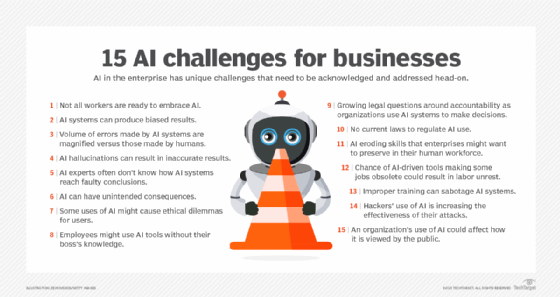
Rymden - stock.adobe.com
AI adoption hovers around 25% for office workers
Perficient and Thomson Reuters surveys show that AI adoption is limited in some sectors, but there's lots of experimentation and evaluation happening.
If your organization struggles to prove business use cases for AI, you're not alone. In fact, you're in the majority, according to two recent studies.
The two surveys from large consultancies released this month show that about 25% of companies have adopted generative AI broadly across offices, and about another quarter either have targeted AI deployments for specific use cases or plan to.
Approximately half of the organizations responding either aren't planning to adopt AI or are experimenting with it to determine whether or not to move forward with deployments.
Digital consultancy Perficient, which released its "State of GenAI in the Workforce Survey" today, polled 1,054 North Americans across all industries and government on their attitudes and use of AI at work. Some 26% described their organizations as "all in" on AI adoption, with another 28% indicating that they had begun a few focused AI deployments. Of those AI tools in use, many were ready-made right out of the box, others were built on low-code platforms, and the rest were custom-built from scratch.
An unexpected finding for the researchers was how little generative AI training workers get.
"The number of people who basically report that they get the occasional email from corporate IT -- and not much else -- was really surprising," said Eric Walk, principal for enterprise data strategy at Perficient. "Something that we find anecdotally in our work is that adoption is primarily driven by good training and good enablement."
Different respondents had different expectations of their AI tools: 17% said it increased the quantity of their output, 32% said it improved the quality, and 27% said both.
In particular, robot co-workers are returning impressive results for those using AI. Further, two-thirds of respondents who use AI reported that it takes seven to 10 years of human job experience to replicate the quality of work that AI produces.

Thomson Reuters looks at law, tax and other sectors
In its "2025 Generative AI in Professional Services Report," Thomson Reuters surveyed 1,702 tax, accounting and audit, corporate risk and fraud, and government professionals on their AI adoption and attitudes toward AI. This cohort similarly showed 22% using AI, 18% planning to use, 32% considering to use and 28% with no plans to use the technology.
Those numbers represent nearly double the AI adoption from last year in the annual report, and almost 90% of respondents across the board believe that AI can be used for work in their sectors. However, that doesn't mean it should, respondents said. Less than half of government employees and nearly 60% of legal workers said AI should be applied to their work -- significantly less than the "could" camps.
Those who think AI should be applied to their work cite reasons of automating low-value work, streamlining work processes and the potential for saving time. Those who aren't yet ready for AI adoption say it needs regulation and lacks human intuition, and they have concerns about AI's reliability and accuracy in work. When it comes to fears, half of tax workers see AI as a more than minimal threat to their jobs, while nearly two-thirds of legal workers do.
Legal workers' top fear is that AI will promote the unlicensed practice of law online, with 73% calling it either a "major" threat or "somewhat" of a threat.
Attorneys, tax preparers and risk managers want to use AI to automate routine tasks, which frees up time to do more strategic work, said Laura Clayton McDonnell, president of the corporates business segment at Thomson Reuters. But they're not yet ready to trust AI for higher-level tasks when a business decision or the organization's reputation is on the line.
That reveals a dichotomy between the AI that people trust in their personal and professional lives, McDonnell said.
"Folks wouldn't even think twice about taking their personal phone and clicking on ChatGPT and asking questions or going onto Google and doing a search ... but when you get into the professional environment, folks pause," she said. "That transition between your personal life and professional life is not that smooth."
Don Fluckinger is a senior news writer for Informa TechTarget. He covers customer experience, digital experience management and end-user computing. Got a tip? Email him.







